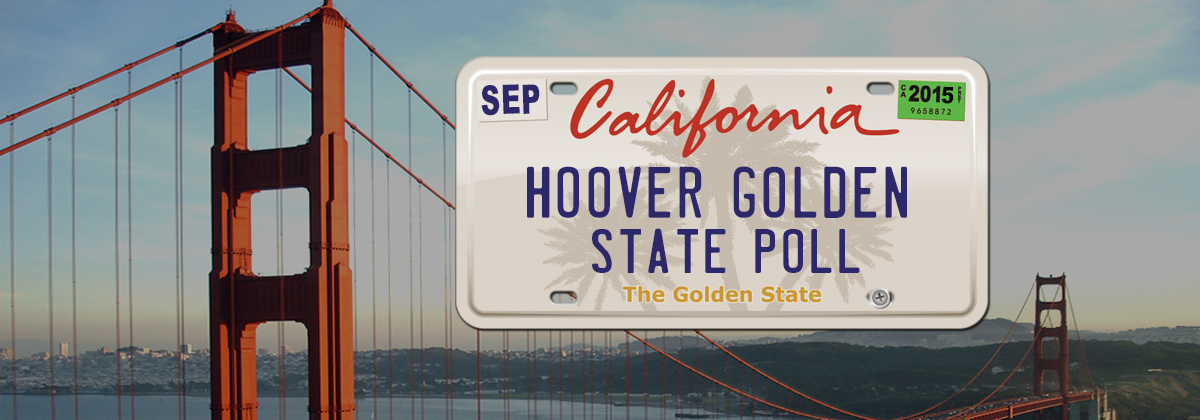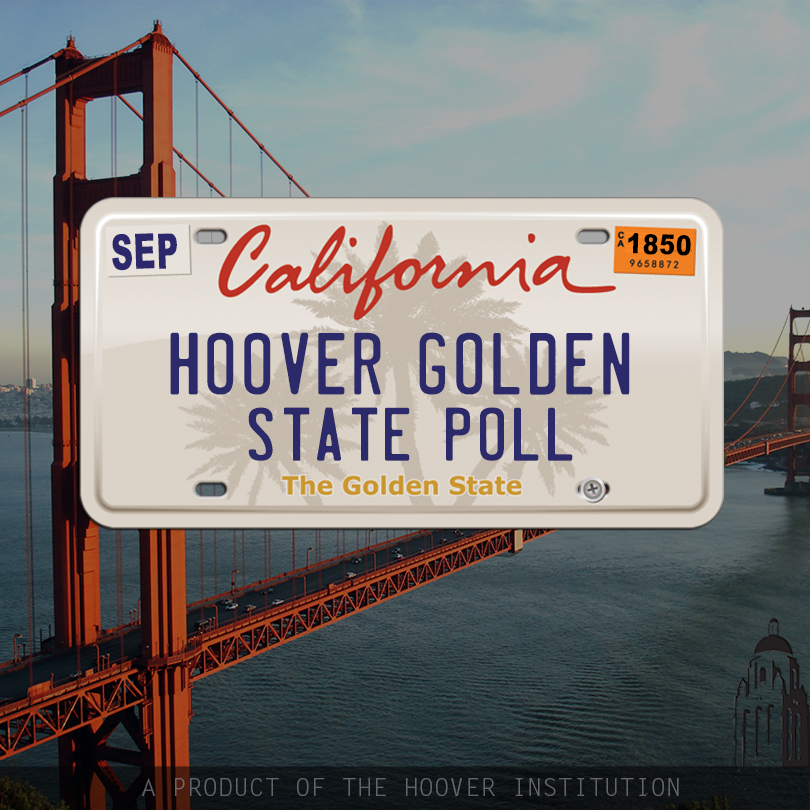
Stanford, CA: As California copes with its four-year drought, a new Hoover Institution survey shows that the Golden State’s electorate is amenable—across ideological and regional divides--to continued water conservation and sharing groundwater resources with neighboring communities.
“The drought is that rare occurrence that affects Californians from all walks of life,” said Hoover Institution research fellow Bill Whalen. “The good news in this survey is that voters are open to sharing and sacrifice –even though it might require some skilled salesmanship from the state’s leaders.”
The Hoover Institution’s Golden State Poll, administered by the survey research firm YouGov and designed in conjunction with Stanford University’s Bill Lane Center for the American West, reveals “dealing with the state’s water problems” as Californians’ lead priority for state government at this time.
According to Hoover’s findings, 54 percent of likely California voters support required water cutbacks, with limits and fines. Only 24 percent preferred no limits, with higher costs per gallon for heavier use. Sixty-two percent of likely voters support required sharing of groundwater supplies; 67 percent supported restrictions on groundwater use.
“The poll suggests that, if the drought persists, Californians will support changes in the way California currently stores and allocates its water,” concludes Bruce Cain, director of Stanford’s Bill Lane Center for the American West. “Crisis might present an opening for the much needed compromise that has for so long eluded California’s water politics.”
The survey, which interviewed 1,500 adult (18 and up) Californians who live in the San Francisco Bay Area, Central Valley, and Southern California, was conducted from August 31 to September 11. The survey has a margin of error of plus or minus 3.4 percent for the full weighted sample.
- When not made aware of how wastewater recycling works, only 10 percent of Californians outside Orange County (which already has a wastewater-recycling program) said they’d drink it. Eighteen percent said they’d cook with it; 22 percent would bathe in it. Knowing more about the scientific facts behind water recycling, support grows to 20 percent, 29 percent, and 43 percent, respectively.
- Californians prefer an “all of the above” approach to augmenting water storage: building dams and reservoirs (70 percent of likely voters), desalination (82 percent), more storage in underground aquifers (89 percent), collecting and recycling storm water (91 percent).
- Fifty-three percent of likely voters favored relaxing environmental laws to build water storage and transportation, an issue that’s a tougher sell with Democrats (36 percent ) than Republicans (76 percent) or Independents (65 percent).
- Opinion was more closely divided on the reduction or elimination of subsidies for farmers' water, with 49 percent in favor of ending them versus 30 percent opposed. Republicans split 40 percent in favor to 43 percent opposed; Democrats were 56 percent to 21percent; Independents, 49 percent to29 percent.
- Support for giving some of the water currently used for agriculture to residential and other business use varied with voters’ familiarity. With no information, only 29 percent favor and 39 percent oppose reallocating agricultural water. When told that agriculture currently uses 40 percent of California's water, 38 percent favored and 36 percent opposed. When a third group was told that agriculture uses 80 percent of the water put to human use in California, the numbers shifted to 47 percent in favor and 30 percent opposed.
For full poll results, go to Hoover Golden State Poll.
The September-October 2015 issue of Eureka, a Hoover Institution online publication focusing on policy, political, and economic issues confronting California, will be released in conjunction with this Golden State Poll.
That issue centers on California’s drought, including a look at innovation already under way in Orange County, smart state-level policies moving forward, and a personal reflection by Hoover senior fellow Victor Davis Hanson, a fifth-generation California farmer. In addition, Hoover research fellow Carson Bruno provides an in-depth analysis of the poll’s results.
The Hoover Institution Golden State Poll is conducted quarterly by researchers at the Hoover Institution at Stanford University, in partnership with the survey research firm YouGov. The September 2015 Hoover investigators are Carson Bruno; Lanhee Chen, PhD; Tammy Frisby, PhD; and Bill Whalen, with further guidance provided by Bruce Cain, PhD, the Spence and Cleone Eccles Family Director of Stanford University’s Bill Lane Center for the American West.
About the Hoover Institution: The Hoover Institution, Stanford University, is a public policy research center devoted to the advanced study of economics, politics, history, and political economy—both domestic and foreign—as well as international affairs. With its eminent scholars and world-renowned Library & Archives, the Hoover Institution seeks to improve the human condition by advancing ideas that promote economic opportunity and prosperity and secure and safeguard peace for America and all mankind.
CONTACT INFORMATION: Jenny Mayfield | Hoover Institution | Director of Media Relations | Office of Public Affairs | 650-723-0603 | jennymayfield@stanford.edu

























